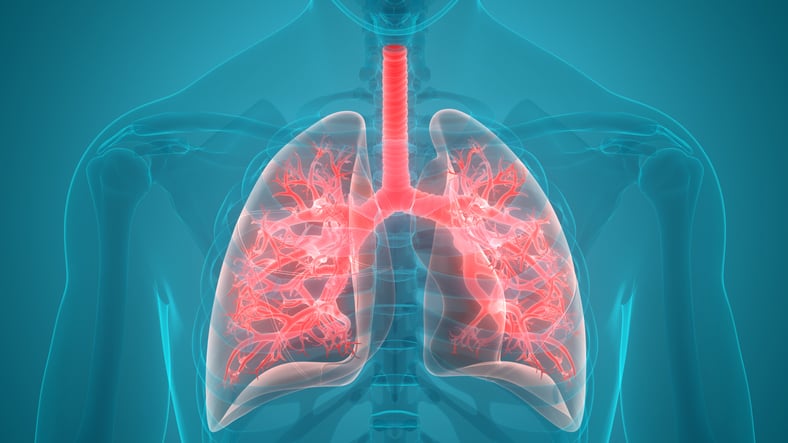
Treatment with the novel biologic tezepelumab was associated with nominally significant reductions in airway submucosal eosinophils, compared to placebo, in patients with uncontrolled, moderate-to-severe asthma in phase II findings from the international, randomized CASCADE trial.
The reduction in bronchial eosinophils was seen in patients with high and low levels of type 2 inflammatory markers at baseline.
Clinically meaningful differences in spirometry or exacerbation frequency were not observed in the tezepelumab- versus placebo-treated patients, but treatment with the biologic was associated with meaningful reductions in airway hyperresponsiveness—as measured by mannitol challenge—compared to placebo.
Writing in the journal Lancet Respiratory Medicine, Sarah Diver, MD, of the University of Leicester, Leicester, U.K., and colleagues, wrote that while treatment with tezepelumab had little impact on clinical outcomes in the phase II, exploratory study, “the bronchial biopsy findings and mannitol challenge results suggest that improvements in asthma clinical outcomes observed with tezepelumab in previous studies might have been related, at least in part, to reductions in eosinophilic airway inflammation and airway hyperresponsiveness.”
Tezepelumab is a novel human monoclonal antibody that targets the cytokine thymic stromal lymphopoietin (TSLP), which is a key driver of airway inflammation.
In the phase III NAVIGATOR and PATHWAY trials, treatment with the TSLP-blocking monoclonal antibody was found to significantly reduce exacerbations and improve lung function in patients with uncontrolled, severe asthma.
Tezepelumab treatment was also associated with reductions in T2 biomarker levels, including blood eosinophils, serum total IgE, and fractional exhaled nitric oxide (FeNO).
Diver and colleagues wrote that the failure to show a clinically meaningful impact on clinical outcomes in the phase II CASCADE trial could have been due to the smaller number of participants and recruitment of patients with relatively stable disease.
The CASCADE study—conducted at 27 medical centers in Canada, Denmark, Germany, the U.K., and U.S.—included 116 adults with uncontrolled moderate-to-severe asthma randomized (1:1) to treatment with either tezepelumab (210 mg) or placebo given subcutaneously every four weeks for 28 weeks (extended to up to 52 weeks in patients whose end-of-treatment assessments were delayed due to Covid-19).
The primary study endpoint was the change from baseline to the end of treatment in the number of airway submucosal inflammatory cells in bronchoscopic biopsy samples, with eosinophils, neutrophils, CD3+ T cells, CD4+ T cells, tryptase+ mast cells, and chymase+ mast cells evaluated separately.
An exploratory outcome was airway hyperresponsiveness to mannitol, and study participants who completed at least 20 weeks of treatment had an end-of-treatment visit up to eight weeks after the last dose of study drug, and had evaluable baseline and end-of-treatment bronchoscopies. All participants who received at least one dose of study drug were included in the safety analyses.
Among the main findings:
- Tezepelumab resulted in a “nominally significantly greater reduction” from baseline to the end of treatment in airway submucosal eosinophils versus placebo (ratio of geometric least-squares means 0.15; 95% CI, 0.05-0.41; nominal P<0.0010). This difference was observed for all biomarker subgroups.
- No significant differences were observed between treatment groups in the other cell types evaluated (ratio of geometric least-squares means: neutrophils, 1.36; 95% CI, 0.94-1.97: CD3+ T cells, 1.12; 95% CI, 0.86-1.46: CD4+ T cells, 1.18; 95% CI, 0.90-1.55: tryptase+ mast cells, 0.83; 95% CI, 0.61-1.15: chymase+ mast cells, 1.19; 95% CI, 0.67-2.10; all P>0.10).
- No significant differences in the 2 groups were seen in the secondary endpoints of reticular basement membrane thickness and epithelial integrity.
- Exploratory analysis showed reductions in airway hyperresponsiveness to mannitol which were significantly greater with tezepelumab versus placebo (least-squares mean change from baseline in interpolated or extrapolated provoking dose of mannitol required to induce ≥15% reduction in FEV1 from baseline: tezepelumab, 197.4 mg; 95% CI 107.9-286.9: placebo, 58.6 mg; 95% CI, −30.1 to 147.33 for a difference of 138.8, 95% CI, 14.2-263.3; nominal P=0.030).
A total of 53 participants in the tezepelumab-treatment group (90%) and 51 (90%) patients in the placebo group reported adverse events, but the researchers noted that there were “no safety findings of concern.”
The researchers noted that while tezepelumab is in development for severe asthma, the CASCADE study enrolled patients with mild-to-moderate asthma, “because the challenges of bronchoscopy precluded many patients with severe asthma from participating.”
“It is unknown whether there is a distinct pathophysiology of severe asthma compared with moderate-to-severe asthma, but this should be taken into account when extrapolating the findings from this study to patients with severe asthma,” they wrote.
-
Treatment with the novel biologic tezepelumab was associated with nominally significant reductions in airway submucosal eosinophils, compared to placebo, in patients with uncontrolled, moderate-to-severe asthma in phase II findings from the CASCADE clinical trial.
-
Clinically meaningful differences in spirometry or exacerbation frequency were not observed in the tezepelumab- versus placebo-treated patients.
Salynn Boyles, Contributing Writer, BreakingMED™
This research was funded by AstraZeneca and Amgen. Diver reported no relevant disclosures. Several study researchers reported being employees of and/or owning stock in AstraZeneca or Amgen or receiving consultancy fees or other fees from the companies.
Cat ID: 63
Topic ID: 89,63,730,100,192,63,925


